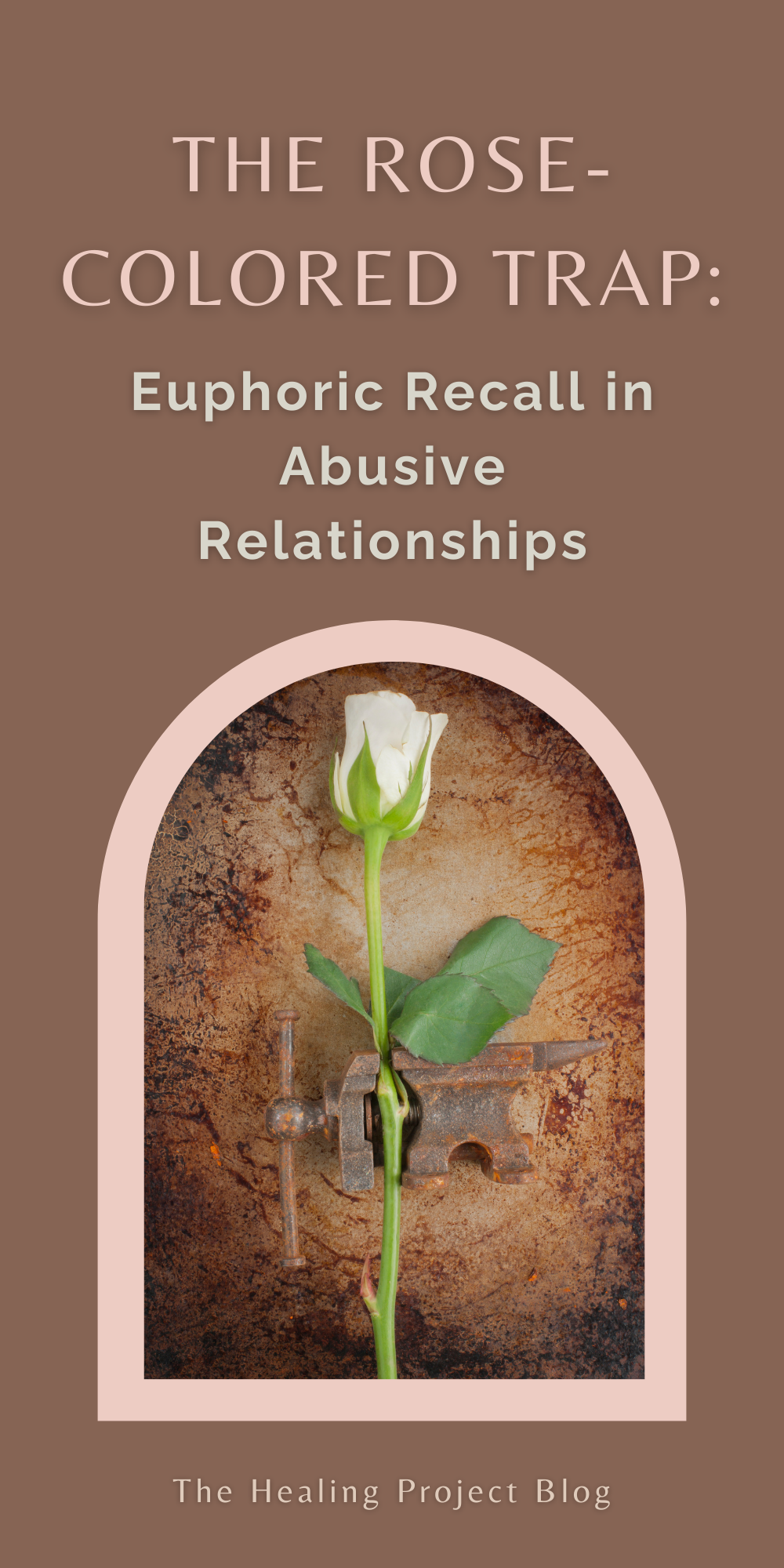The Rose-Colored Trap: Euphoric Recall in Abusive Relationships
When "Good Times" Overshadow Abuse
Surviving an abusive relationship is an obstacle course of emotional challenges. One of the more complicated obstacles is
euphoric recall, a psychological phenomenon where the mind focuses on the positive memories while minimizing the negative ones.
This can make the lure of returning to an abusive relationship powerful and confusing. The connection euphoric recall shares with the
trauma bond and
cycle of abuse makes it incredibly difficult for survivors to truly escape.
What is Euphoric Recall?
Euphoric recall is the tendency to remember past experiences in an overly positive light, often overlooking or downplaying the painful and harmful aspects. In the context of abusive relationships, this can manifest as a persistent longing for the good times, making it difficult to maintain clarity about the reasons for leaving the relationship in the first place.

How Euphoric Recall Works
The human brain has a remarkable ability to filter memories, often highlighting moments of joy and connection while pushing traumatic experiences to the background. This selective memory can create a distorted view of the past, especially when combined with the emotional highs that often follow periods of abuse.
Additionally, trauma bonding—a psychological response to intermittent reinforcement of reward and punishment—can amplify positive memories. Abusers often use manipulation and gaslighting to distort the survivor’s perception of reality, making it even harder to remember the abuse accurately.
The Role of the Cycle of Abuse
Understanding euphoric recall requires a look at the cycle of abuse, which includes phases of tension building, incident, reconciliation, and calm. The "honeymoon phase" or reconciliation period is particularly problematic because it reinforces the positive memories that euphoric recall clings to. During this phase, the abuser may be charming, loving, and attentive, creating powerful positive memories that can overshadow the incidents of abuse.

Identifying Euphoric Recall
Recognizing euphoric recall in your own thoughts and feelings can be challenging but is crucial for healing. Here are some signs you might be experiencing euphoric recall:
- Selective Memory: Focusing on positive memories while minimizing or forgetting the negative ones.
- Emotional Reactions: Intense longing or nostalgia for the abuser, especially when thinking about specific positive memories.
- Minimizing Past Harm: Downplaying or rationalizing the abuse as "not that bad" compared to the good times.
- Distorted Perceptions: Believing that the abuser has changed or that the relationship could be different this time.
Real-Life Example
One of my clients shared how euphoric recall almost led her back into the arms of her abuser. Despite remembering the physical and emotional abuse, she found herself longing for the moments of kindness he showed. It wasn’t until she revisited her journal entries, filled with detailed accounts of the abuse, that she snapped back to reality. Through therapy and support from her friends, she was able to break free from the cycle of euphoric recall and move towards healing.

Breaking Free from Euphoric Recall
To counteract euphoric recall, consider these strategies:
- Journaling: Document your experiences, including the abusive incidents. Reading over your journal entries can provide a reality check.
- Support Networks: Engage with friends, family, or support groups who can remind you of the reality of the abuse.
- Therapy: A trauma-informed therapist can help you process your experiences and develop strategies to maintain clarity.
- Mindfulness Practices: Techniques such as mindfulness meditation can help you stay grounded in the present and aware of your thoughts.
While euphoric recall is a natural psychological response, it's essential to stay vigilant and focused on the reality of the situation. If you find yourself struggling with euphoric recall, remember that your feelings and experiences are valid. There are resources and communities ready to support you in your journey towards a healthier future.
If you need support,
Underground Moves offers resources and guidance for those navigating life after an abusive relationship.

Related Books
Here are a few suggested resources that I often recommend to my clients who are in the process of surviving, healing, and even thriving after abuse. If you would like to work with me, you are always welcome to Book a Private Appointment.
Trauma and Recovery
The Aftermath of Violence—from Domestic Abuse to Political Terror
- A foundational text on understanding and treating trauma, with a particular focus on interpersonal abuse.
Why Does He Do That?
Inside the Minds of Angry and Controlling Men
- Insightful book that delves into the psychology of abusive men and offers guidance for survivors.
Healing from Hidden Abuse
A Journey Through the Stages of Recovery from Psychological Abuse
- A step-by-step guide to recovering from psychological and emotional abuse.
Understanding euphoric recall is crucial for anyone recovering from an abusive relationship. By recognizing this phenomenon and employing strategies to counteract it, survivors can maintain clarity and continue their journey towards healing.
If you're facing similar challenges, know that you're not alone. Resources and support networks, like
Underground Moves, are available to help you navigate these complex emotions and move forward towards a healthier, more empowered future.
Wishing you empowerment in the face of your own reality,
Gretchen
SOMATIC TRAUMA SPECIALIST + ENERGETIC INTUITIVE

SHARE ON PINTEREST







